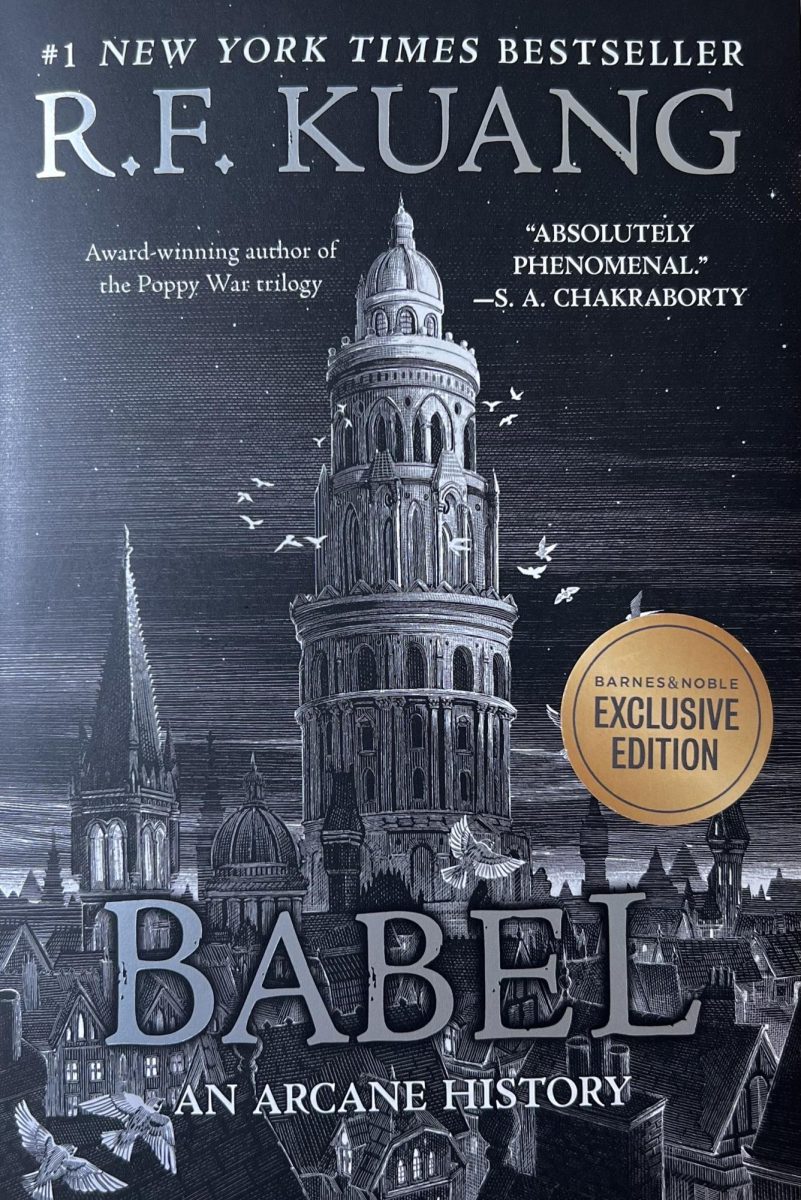Controversy has taken the world by storm. The phrases “hot take” and “unpopular opinion” are emboldened on YouTube thumbnails, article titles, and TikTok covers. As social media has developed, society in turn has begun promoting individualistic opinions as they seek unique topics that dwell from the norm.
But no novel has sparked such academic conversation and intellectual controversy in the media as Babel: Or the Necessity of Violence: An Arcane History of the Oxford Translators’ Revolution by R.F. Kuang. Published in 2022, it won Blackwell’s Books of the Year for Fiction and the Nebula Award for Best Novel. The standalone also debuted as the first book on the New York Times Best Seller list.
Delving deep into British imperialism and the historical contexts of race and academia, this book captured me wholly through the usage of meticulous language. As in fashion with the main theme of translation, Kuang honors the value in each word that is printed on the page. Every tone inflection, implication, and emotion is flawlessly executed in the progression of the plot and conflicts amongst characters.
The detailed footnotes outline the context surrounding the major events of the novel, offering yet another layer of complexity to the world-building. Strategically, Kuang also opts to insert an occasional sardonic statement.
Although the additional commentary was successful in building the novel’s history and setting, I found the characters distant. Each member of the main cast: Robin, Ramy, Victoire, and Letty represented a community of a minority that was shunned in 17th century England. The clear representation of marginalized groups was compelling to me as an Asian-American person; however, many argued that the novel was “preachy” and “anti-white.”
According to a review written for The Fictionfox, “the astounding lack of subtlety in the plot and central messages” was repetitive and lacked depth. The reviewer also points out that “our heroes are all people of color, and literally every white character is portrayed to be a narcissistic and elitist racist.” (Side note, one of the main protagonists, Letty, is a white woman. Furthermore, Professor Craft is a white woman who is supportive of the heroes’ intentions; however, it is undeniable that her character is minor and minimally developed.)
This sentiment was echoed by many readers, some of whom argued that the portrayal of white people was counterproductive to the progression of an open-minded and inclusive community. On the other hand, Abby Horton shared in an article titled, “Let’s babble about Babel”, that “Reading Babel as a white person made me feel uncomfortable, but after doing some reflecting I realized that the whole purpose of this book was to make white people uncomfortable and to make them think.” Horton later applauded Kuang for her ability to weave historical issues into an entertaining plotline.
I would like to echo the praise that Kuang has received for her masterful plot and intertwining of historical and social complexities into the novel’s storyline. The depiction of Oxford was captivating and intoxicating in an unnerving way- I was enamored with the passion represented and simultaneously was aware of the atrocities that the institution stood for. However, I also agree that the characters were a shade lacking compared to the cast of Kuang’s debut series, The Poppy War. Still, I found that this insufficiency was made up for by their poisonous nature and conflicting relationships.
An excerpt from Amazon’s blurb for Babel reads,
“For Robin, Oxford is a utopia dedicated to the pursuit of knowledge. But knowledge obeys power, and as a Chinese boy raised in Britain, Robin realizes serving Babel means betraying his motherland. As his studies progress, Robin finds himself caught between Babel and the shadowy Hermes Society, an organization dedicated to stopping imperial expansion. When Britain pursues an unjust war with China over silver and opium, Robin must decide…
Can powerful institutions be changed from within, or does revolution always require violence?”
With ironic comparison, the discussion of Babel has sparked controversy regarding racial representation and academic elitism. Among the clamoring of voices and opinions, it is necessary to recall the novel’s theme of nonviolent resistance and advocacy. But where will you stand at the crossroads of it all? I recommend that you find this novel at your nearest bookstore to find out.






















































